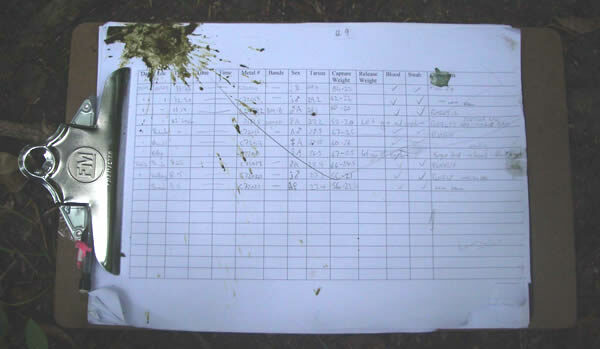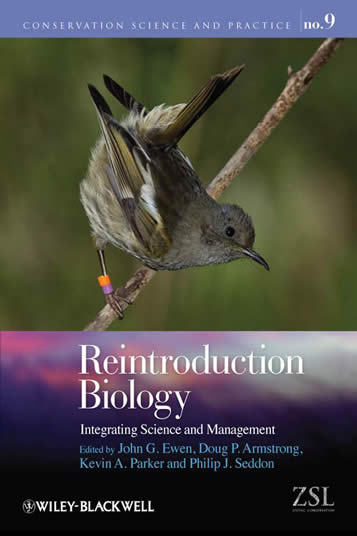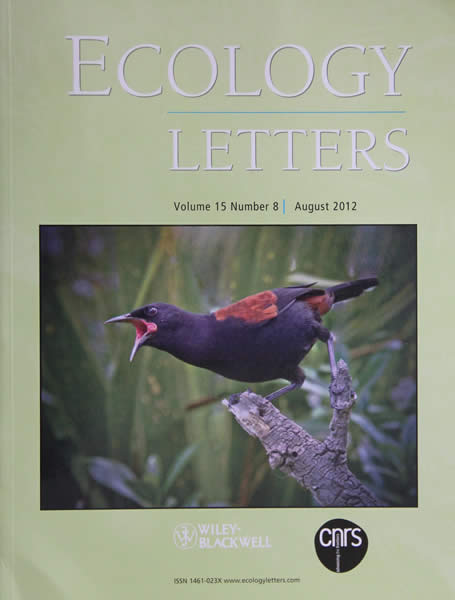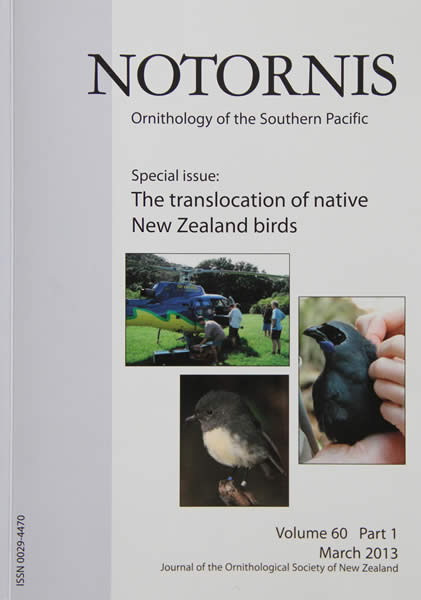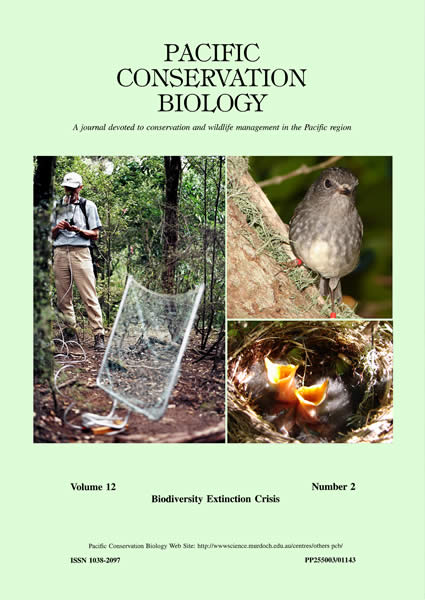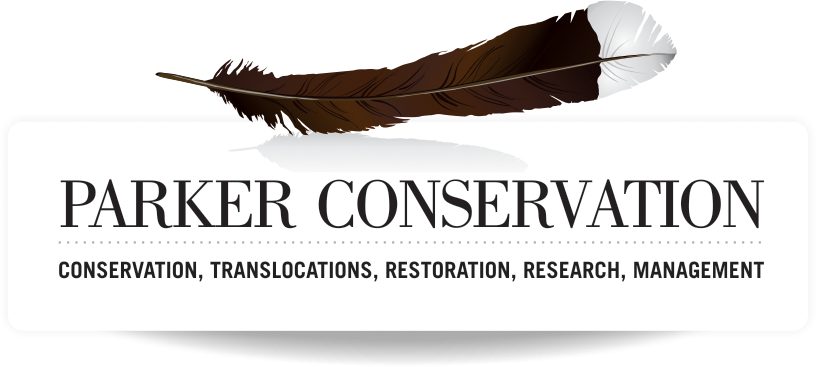
Conservation
Research
Our foremost research interest is in using science to understand and improve conservation, reintroduction biology and the management of seabirds and southern ecosystems.
We enjoy, appreciate and value basic science but the urgency of conservation demands the immediate outcomes provided by applied science.
Fortunately, basic and applied sciences are not mutually exclusive and we are fascinated by the intersection of the two. For instance, Kevin’s recent work examining the impacts of translocation on the cultural evolution of song advanced our theoretical understanding of cultural evolution, illustrated previously unrecognised evolutionary impacts of conservation management, and, more practically, has established a new population of North Island saddlebacks at Tawharanui Regional Park, a site co-managed by a community conservation group and readily accessible to the public. Working in this manner combined demonstrated expertise in reintroduction biology with extensive skills and experience translocating birds to produce valuable applied and basic science.
Kevin is a member of research teams recently awarded a Marsden Grant by the Royal Society of New Zealand (2017) and a Ministry of Business, Innovation and Employment Endeavour Fund Contract (2018) has ongoing collaborations with colleagues in New Zealand, the United Kingdom and the USA. Kalinka and Graham continue to work with colleagues from NZ, South Africa, the United Kingdom, South Georgia, Falkland Islands and Europe on Southern Ocean conservation projects. We are always open to new and interesting collaborations, particularly those that address some aspect of conservation biology.
Scientific papers, books and book chapters 2001-present (reprints available on request)
- Fischer, J.H., Bose, S., Romero, C., Charteris, M., Crowe, P., Parker, G.C., Ray, S., Rexer-huber, K., Sagar, P.M., Thompson, D.R., Bell, E., Debski, I., Quiñones, J. 2022. Combining tracking with at-sea surveys to improve occurrence and distribution estimates of two threatened seabirds in Peru. Bird Conservation International, 1–12 https://doi.org/10.1017/S0959270922000442
- Mattern, T., Rexer-Huber, K., Parker, G., Amey, J., Green, C-P., Tennyson, A.J.D., Sagar, P.M., Thompson, D.R. 2021. Erect-crested penguins on the Bounty Islands: population size and trends determined from ground counts and drone surveys. Notornis 68(1): 37-50.
- Jones, C.W., Risi, M.M., Osborne, A.M., Parker, G.C., Rexer-Huber, K., Le Bouard, F., Cleeland, J.B., Lawrence, K., Kinchin-Smith, D., Witcutt, E., Starnes, T., Bond, A.L., Ryan, P.G., Oppel, S. 2020. Abundance, distribution and breeding success of the endemic Gough Island Finch Rowettia goughensis between 2009 and 2018. Emu – Austral Ornithology doi.org/10.1080/01584197.2020.1773859
- Rexer-Huber, K., Thompson, D.R., Parker, G.C. 2020. White-chinned petrel (Procellaria aequinoctialis) burrow density, occupancy, and population size at the Auckland Islands. Notornis 67: 387–401.
- Elliott, G., Walker, K., Parker, G.C., Rexer-Huber, K., Miskelly, C.M. 2020. Subantarctic Adams Island and its birdlife. Notornis 67: 153–187.
- Parker, G.C., French, R., Muller, C.G., Taylor, G.A., Rexer-Huber, K. 2020. First northern giant petrel (Macronectes halli) breeding population survey and estimate for the Auckland Islands, New Zealand. Notornis 67: 357–368.
- Miskelly, C.M., Elliott, G.P., Parker, G.C., Rexer-Huber, K., Russ, R.B., Taylor, R.H., Tennyson, A.J.D., Walker, K.J. 2020. Birds of the Auckland Islands, New Zealand subantarctic. Notornis 67: 59–151.
- Rexer-Huber, K., Walker, K., Elliott, G., Baker, G.B., Debski, I., Jensz, K., Sagar, P.M., Thompson, D.R., Parker, G.C. 2020. Population trends of light-mantled sooty albatross (Phoebetria palpebrata) at Adams Island and trial of ground, boat, and aerial methods for population estimates. Notornis 67: 341–355.
- Walker, K., Elliott, G.P., Rexer-Huber, K., Parker, G.C., McClelland, P., Sagar, P.M. 2020. Shipwrecks and mollymawks: an account of Disappointment Island birds. Notornis 67: 213–245.
- Carneiro, A.P.B., Pearmain, E.J., Oppel, S., Clay, T.A., Phillips, R.A., Bonnet‐Lebrun, A., Wanless, R.M., Abraham, E., Richard, Y., Rice, J., Handley, J., Davies, T.E., Dilley, B.J., Ryan, P.G., Small, C., Arata, J., Arnould, J.P.Y., Bell, E., Bugoni, L., Campioni, L., Catry, P., Cleeland, J., Deppe, L., Elliott, G., Freeman, A., González‐Solís, J., Granadeiro, J.P., Grémillet, D., Landers, T.J., Makhado, A., Nel, D., Nicholls, D.G., Rexer‐Huber, K., Robertson, C.J.R., Sagar, P.M., Scofield, P., Stahl, J., Stanworth, A., Stevens, K.L., Trathan, P.N., Thompson, D.R., Torres, L., Walker, K., Waugh, S.M., Weimerskirch, H., Dias, M.P. 2020. A framework for mapping the distribution of seabirds by integrating tracking, demography and phenology. Journal of Applied Ecology 57: 514–525.
- Dilley, B.J., Hedding, D.W., Henry, D.A.W., Rexer-Huber, K., Parker, G.C., Schoombie, S., Osborne, A., Ryan, P.G. 2019. Clustered or dispersed: testing the effect of sampling strategy to census burrow-nesting petrels with varied distributions at sub-Antarctic Marion Island. Antarctic Science 31: 231–242.
- Rexer‐Huber, K., Veale, A.J., Catry, P., Cherel, Y., Dutoit, L., Foster, Y., McEwan, J.C., Parker, G.C., Phillips, R.A., Ryan, P.G., Stanworth, A.J., Stijn, T., Thompson, D.R., Waters, J., Robertson, B.C. 2019. Genomics detects population structure within and between ocean basins in a circumpolar seabird: The white‐chinned petrel. Molecular Ecology 28: 4552–4572.
- Harrington, K.J., Pole-Evans, S., Reeves, M., Bechard, M., Bobowski, M., Barber, D.R., Rexer-Huber K., Lecomte, N., Bildstein, K.L. 2018. Seasonal micro-migration in a farm-island population of striated caracaras (Phalcoboenus australis) in the Falkland Islands. Movement Ecology 6: 4.
- Parker G.C., Rexer-Huber K., Thompson, D. 2017. Grey petrel population on Campbell Island 14 years after rodent eradication. Antarctic Science 29: 209–216.
- Rexer-Huber K., Parker G.C., Sagar, P.M., Thompson, D.R. 2017. White-chinned petrel population estimate, Disappointment Island (Auckland Islands). Polar Biology 40: 1053–1061.
- Parker, K.A., Lovegrove, T.G., Chambers, R., Harmer, A. 2016. A guide for banding North Island robin (Petroica longipes) nestlings. New Zealand Journal of Zoology 43: 307-310.
- Richardson, K., Ewen, J.G., Brekke, P., Doerr, L.R., Parker, K.A., Armstrong, D.P. 2016. Behaviour during handling predicts male natal dispersal distances in an establishing reintroduced hihi (Notiomystis cincta) population. Animal Conservation 20: 135-143
- Torres, L.G., Rayment, W., Olavarrıá, C., Thompson, D.R., Graham, B., Baker, C.S., Patenaude, N., Bury, S.J., Boren, L., Parker, G., Carroll, E.L. 2016. Demography and ecology of southern right whales Eubalaena australis wintering at sub-Antarctic Campbell Island, New Zealand. Polar Biology 40: 95–106.
- Parker, G.C., Black, A., Rexer-Huber, K., Sommer, E.C., Cuthbert, R.J. 2015. Low population density and biology of an island population of house mice Mus musculus on South Georgia. Polar Biology 39: 1175–1181.
- Parker, K.A., Ludwig, K., King, T., Brunton, D.H., Scofield, R.P., Jamieson, I.G. 2014. Differences in vocalisations, morphology and mtDNA support species status for New Zealand saddleback Philesturnus spp. New Zealand Journal of Zoology 41: 79-94.
- Laptikhovsky, V., Brickle, P., Söffker, M., Davidson, D., Roux, M., Rexer-Huber K., Brewin, P.E., Kälkvist, E., Brown, J., Brown, S., Black, A., Anders, N.R., Cartwright, S., Poncet, D., Parker G. 2015. Life history and population characteristics of the Antarctic starfish, Anasterias antarctica Lütken, 1856 (Asteroidea: Forcipulata: Asteriidae) around the Falkland Islands. Polar Biology 38: 463–474.
- Morrison, S.A., Parker, K.A., Collins, P.W., Funk, W.C., Sillett, T.S. 2014. Reintroduction Of Historically Extirpated Taxa On The California Channel Islands. Western North American Naturalist 7: 531-542.
- Rexer-Huber, K., Parker, G.C., Ryan, P.G. and Cuthbert, R. 2014. Burrow occupancy and population size in the Atlantic Petrel: a comparison of methods. Marine Ornithology 37: 137-141.
- Parker, K.A. 2013. Avian translocations to and from Tiritiri Matangi 1974-2011. New Zealand Journal of Ecology 37: 282-287.
- Rexer-Huber, K., Parker, G.C., Reeves, M., Stanworth, A.J. and Cuthbert R.J. (2013) Winter ecology of house mice and the prospects for their eradication from Steeple Jason. Polar Biology 36: 1791-1797.
- Ewen, J.G., Renwick, R., Adams, L., Armstrong, D.P., Parker, K.A. 2013. 1980-2012 : 32 years of re-introduction efforts of the hihi (stitchbird) in New Zealand. In Global Re-introduction Perspectives : 2013 (Soorae, P.S., editor). IUCN/SSC Re-introduction Specialist Group and Evironmental Agency, Abu Dhabi.
- Cuthbert, R. J., Louw, H., Parker, G., Rexer-Huber, K., Visser, P. (2013) Observations of mice predation on dark-mantled sooty albatross and Atlantic yellow-nosed albatross chicks at Gough Island. Antarctic Science 25: 763-766.
- Hill, S.D., Ji, W., Parker, K.A., Amoit, C., Wells, S.J. 2013. A comparison of vocalisations between mainland tui (Prosthemadera novaeseelandiae novaeseelandiae) and Chatham Island tui (P. n. chathamensis). New Zealand Journal of Ecology 7: 214-223.
- Black, A., Parker, G., Rexer-Huber, K., Sommer, E. and Cuthbert, R. J. (2013) Kerguelen petrel (Lugensa brevirostris): a ‘new’ breeding species for South Georgia. Antarctic Science 25: 69-70.
- Adams, N.J., Parker, K.A., Cockrem, J.F., Brunton, D.H., Candy, E.J. 2013. Inter island differences in corticosterone responses of North Island Saddlebacks (Philesturnus rufusater) in New Zealand do not suggest selective effects of translocation. Emu 113: 45-51.
- Rexer-Huber, K. and Bildstein, K. L. (2013) Winter diet of striated caracara Phalcoboenus australis (Aves, Polyborinae) at a farm settlement on the Falkland Islands. Polar Biology 36: 437-443.
- Parker, K.A. 2013. Restoring Richard Henry’s dream: the evolution of translocation in New Zealand conservation. Notornis 60: 1-2.
- Cuthbert, R. J., Louw, H., Lurling, J., Parker, G., Rexer-Huber, K., Sommer, E., Visser, P. and Ryan, P. G. (2013) Low burrow occupancy and breeding success of burrowing petrels at Gough Island: a consequence of mouse predation. Bird Conservation International 23: 113-124
- Parker, K.A., Ewen, J.G., Seddon, P.J., Armstrong, D.P. 2013. Post-release monitoring of bird translocations: why is it important and how do we do it? Notornis 60: 85-92.
- Smuts-Kennedy, C., Parker, K.A. 2013. Reconstructing avian biodiversity on Maungatautari. Notornis 60: 93-106.
- Parker, K.A., Anderson, M.J., Jenkins, P.F., Brunton, D.H. 2012. The effects of translocation-induced isolation and fragmentation on the cultural evolution of bird song. Ecology Letters 15: 778-785 (Cover article).
- Parker, G.C., Rexer-Huber, K., Parker, K.A., Ryan, P.G., Techow, N.M.S.M., Cuthbert, R.J. 2012. Morphometric and genetic sexing in the Gough Moorhen Gallinula comeri. Bird Study/Ringing and Migration 27: 20-25.
- Rexer-Huber, K., Parker, G. C., Ryan, P. G. and Cuthbert, R. J. (2012) Ringing injuries in the Gough moorhen Gallinula comeri. Ringing & Migration 27: 53–56.
- Ewen, J.G., Armstrong, D.P., Empson, R., Jack, S., Makan, T., McInnes, K., Parker, K.A., Richardson, K., Alley, M. 2012. Parasite management in translocations: lessons from an endangered New Zealand bird. Oryx 46: 446-456.
- Rexer-Huber, K., Schofield, J. C. and Bishop, P. J. (2012) Survival blood sampling in small frogs using “keyhole cardiac puncture”. Herpetological Review 43: 406–410.
- Adams,N.J., Farnworth, M.J., Rickett, J., Parker, K.A., Cockrem, J.F. 2011. Behavioural and corticosterone responses to capture and confinement of wild blackbirds (Turdus merula). Applied Animal Behaviour Science 134: 246-255.
- Cuthbert, R. J., Visser, P., Louw, H., Rexer-Huber, K., Parker, G. and Ryan, P. G. (2011) Preparations for the eradication of mice from Gough Island: results of bait acceptance trials above ground and around cave systems. Pp. 47-50 in C. R. Veitch, M. N. Clout and D. R. Towns, ed. Island invasives: Eradication and management. Gland, Switzerland: IUCN.
- Neate, H., Dowding, J.E., Parker, K.A., Hauber, M.E. 2011. Breeding success of northern New Zealand dotterels (Charadrius obscurus aquilonius) following mammal eradication on Motuihe Island, New Zealand. Notornis 58: 17-21.
- Rexer-Huber, K., Bishop, P. J. and Wharton, D. A. (2011) Skin ice nucleators and glycerol in the freezing-tolerant frog Litoria ewingii. Journal of Comparative Physiology B 181: 781–792.
- Ewen, J.G., Parker K.A., Richardson, K., Armstrong, D., Smuts-Kennedy, C. 2011. Translocation of hihi Notiomystis cincta to Maungatautari, a New Zealand mainland reserve protected by a predator-exclusion fence. Conservation Evidence 8: 58-65.
- Cooper, J. & Parker, G.C. 2011. Observations of sexual dimorphism among the Southern Giant Petrels Macronectes giganteus of Gough Island. Sea Swallow 60: 84-90.
- Parker, K.A., Hauber, M.E., Brunton, D.H. 2010. Contemporary cultural evolution of a conspecific recognition signal following serial translocations. Evolution 64: 2431-2441.
- Parker, K.A., Seabrook-Davison, M., Ewen, J.G. 2010. Opportunities for non-native ecological replacements in ecosystem restoration. Restoration Ecology 18: 269-273.
- Adams, N.J., Parker, K.A., Cockrem, J.F., Brunton, D.H., Candy, E.J. 2010. Corticosterone responses and post release survival in translocated North Island saddlebacks (Philesturnus rufusater) in New Zealand. Emu 110: 296-301.
- Sutherland, W.J., Armstrong, D., Butchart, S.H.M., Earnhardt, J.M., Ewen, J., Jamieson, I., Jones, C.G., Lee, R., Newbery, P., Nichols, J.D., Parker, K.A., Sarrazin, F., Seddon, P.J., Shah, N., Tatayah, V. 2010. Standards for documenting and monitoring bird reintroduction projects. Conservation Letters 3: 229-235.
- Igic, B., Leuschner, N., Parker, K.A., Ismar, S.M.H., Gill, B.J., Lovegrove, T.G., Millar, C.D., Hauber, M.E. 2010. Size Dimorphism and avian-perceived sexual dichromatism in a New Zealand Endemic bird, the whitehead Mohoua albicilla. Journal of Morphology 271: 697-704.
- Parker, K.A. (editor). 2009. Abstracts of papers presented at the Ornithological Society of New Zealand AGM and conference, 30 May 2009, Orewa, New Zealand. Notornis 56: 102-107.
- Seabrook-Davison, M.N.H., Parker, K.A., Brunton, D.H. 2009. Observation of an attack on a mature song thrush (Turdus philomelos) by a black-backed gull (Larus dominicanus). Notornis 55: 219.
- Parker, K.A. 2008. Translocations: providing outcomes for wildlife, resource managers, scientists and the human community. Restoration Ecology 16: 204-209.
- Parker, K.A., Laurence, J. 2008 Translocation of North Island saddleback Philesturnus rufusater from Tiritiri Matangi Island to Motuihe Island, New Zealand. Conservation Evidence 5: 47-50.
- Ewen, J.G., Armstrong, D., Parker, K., Seddon, P. 2008. Avian reintroduction biology: current issues for science and management. Avian Biology 1: 19-42.
- Rayner, M.J., Parker, K.A., Imber, M.J., 2008. Population census of Cook’s petrel Pterodroma cookii breeding on Codfish Island (New Zealand) and the global conservation status of the species. Bird Conservation International 18: 211-218.
- Parker, K.A. 2007. Opportunistic scavenging or active predation of a blackbird (Turdus merula) by an Australian Magpie (Gymnorhina tibicen)? Notornis 54: 42.
- Parker, K.A.; Brunton, D.H.; Jakob-Hoff, R. 2006. Avian translocations and wildlife disease; implications for New Zealand conservation. Pacific Conservation Biology 12: 155-162 (Cover article).
- Parker, K.A.; Hughes, B.; Thorogood, R.; Griffiths, R. 2004. Homing over 56 km by a North Island tomtit (Petroica macrocephala toitoti). Notornis 51: 238-239.
- Parker, K.A.; Brunton, D.H. 2004. Predation of banded rail (Rallus phillippensis) nests in a saltmarsh habitat. Notornis 51: 240-241.
- Parker, K.A. 2004. An aggressive interaction between a North Island fernbird (Bowdleria punctata vealeae) and a spotless crake (Porzana tabuensis). Notornis 51: 241.
- Parker, K. 2001. New Zealand Dotterel catches fish. Notornis 48: 164.
Books and Book Chapters
- Parker, K.A., L. Adams, M. Baling, L. Kemp, G. Kuchling, B. Lloyd, S. Parsons, J. Ruffell, I. Stringer, C. Watts and M.J. Dickens. 2014. Practical guidelines for planning and implementing fauna translocations. Pp 255-272 in Advances in Reintroduction Biology of Australian and New Zealand Fauna (Armstrong, D.P., Hayward, M.W., Moro, D. & Seddon, P.J. Editors). CSIRO publishing, Collingwood, Australia.
- Richardson, K., Doerr, V., Ebrahimi, M., Lovegrove, T.G., Parker, K.A. 2014. Considering dispersal in reintroduction and restoration planning. Pp59-72 in Advances in Reintroduction Biology of Australian and New Zealand Fauna (Armstrong, D.P., Hayward, M.W., Moro, D. & Seddon, P.J. Editors). CSIRO publishing, Collingwood, Australia.
- Ewen, J.G., Armstrong, D.P., Parker, K.A., Seddon, P.J. (Editors). 2012. Reintroduction Biology: integrating science and management. Wiley-Blackwell, Oxford, U.K.
- Parker, K.A., Dickens, M.J., Clarke, R.H., Lovegrove, T.G. 2012. The theory and practise of catching, holding, moving and releasing animals. In: Reintroduction biology: integrating science and management (Ewen, J.G., Armstrong, D.P., Parker, K.A. & Seddon, P.J. Editors). Wiley-Blackwell, Oxford, UK.
Translocation
Conservation and translocation for birds, wildlife and plants.
RESTORATION
SEABIRDS AND FISHERIES
CONSERVATION RESEARCH
Kārearea / NZ falcon
Working with Kārearea / NZ falcon, forestry and farm
FACILITATION AND DECISION MAKING
Facilitation and decision making for threatened species management.
Get In Touch
ABOUT
Parker Conservation provides conservation, bird and wildlife translocation, Southern Ocean ecosystem and ecological restoration services for management and research.
We consult with DoC, councils, companies and individuals within NZ, throughout the South Pacific and internationally. Please contact us for independent, expert advice on your next conservation project.
CONTACT
Email:
parkerconservation@parkerconservation.co.nz
Phone:
021 701 639 Kevin (in NZ)
+64 21 701 639 (international calling)
022 067 8224 Graham (in NZ)
+64 22 067 8224 (international calling)
022 084 9793 Kalinka (in NZ)
+64 22 084 9793 (international calling)
